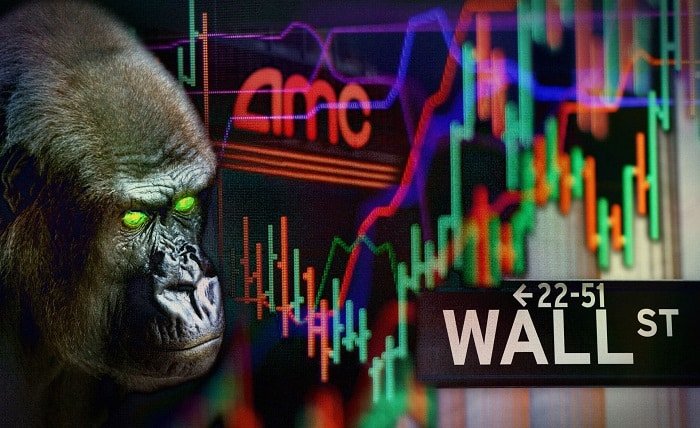
Introduction
Ape stock has taken the financial world by storm, symbolizing a new era of retail investing driven by social media communities. The term “ape stock” refers to stocks heavily promoted and supported by online communities, particularly those on platforms like Reddit’s WallStreetBets. These investors, often self-referred to as “apes,” have created a movement that challenges traditional financial norms.
Ape stock represents more than just a collection of favored stocks; it embodies the power of collective action in the stock market. This phenomenon has captured the attention of both seasoned investors and newcomers, leading to significant market volatility and media coverage. Understanding ape stock is crucial for anyone interested in the dynamics of modern investing.
The Origins of Ape Stock
The origins of ape stock can be traced back to the rise of social media and online communities dedicated to stock trading. Platforms like Reddit, Twitter, and Discord have become breeding grounds for retail investors to share insights, strategies, and support for specific stocks. The term “ape” comes from the self-deprecating humor of these communities, where members often refer to themselves as “apes” or “degenerates” to emphasize their non-traditional approach to investing.
Ape stock gained mainstream attention with the GameStop (GME) short squeeze in early 2021. Retail investors, galvanized by discussions on WallStreetBets, drove up the price of GME stock, causing significant losses for hedge funds that had shorted the stock. This event highlighted the collective power of retail investors and established ape stock as a force to be reckoned with in the financial markets.
Characteristics of Ape Stock
Ape stock typically exhibits several key characteristics that differentiate it from traditional investments. Firstly, ape stock often involves companies with high short interest, making them prime targets for short squeezes. These stocks are heavily discussed and promoted on social media, creating a sense of community and shared purpose among investors.
Another characteristic of ape stock is its volatility. The collective actions of retail investors can lead to rapid price movements, resulting in significant gains or losses within short periods. This volatility is both a draw and a risk for those involved in ape stock trading. Additionally, ape stock investors often prioritize emotional and ideological factors over fundamental analysis, further contributing to its unique market behavior.
The Role of Social Media in Ape Stock
Social media plays a pivotal role in the rise and sustenance of ape stock. Platforms like Reddit, Twitter, and TikTok serve as the primary channels for information dissemination, strategy formulation, and community building. The real-time nature of social media allows for rapid mobilization and coordination among investors, enabling them to act collectively and swiftly.
The influence of social media on ape stock is evident in the way stock prices can surge following viral posts or trending hashtags. Memes, videos, and threads can quickly spread across the internet, drawing in more investors and amplifying the impact on stock prices. This phenomenon underscores the democratization of information and the shift in power dynamics within the stock market.
The Impact of Ape Stock on the Market
The impact of ape stock on the financial markets has been profound and multifaceted. On one hand, ape stock has democratized investing, giving retail investors a voice and influence previously reserved for institutional players. This shift has led to increased market participation and a re-evaluation of traditional investment strategies.
However, the rise of ape stock has also introduced significant volatility and unpredictability into the markets. The collective actions of retail investors can create dramatic price swings, challenging the stability of affected stocks and sectors. Additionally, the focus on heavily shorted stocks has led to debates about market manipulation, regulatory oversight, and the ethical implications of such coordinated efforts.
Legal and Regulatory Considerations
The rise of ape stock has prompted scrutiny from regulators and lawmakers concerned about market stability and investor protection. Regulatory bodies like the SEC have investigated instances of potential market manipulation and misinformation within ape stock communities. These investigations aim to ensure that trading activities comply with existing laws and regulations.
Legal considerations surrounding ape stock also involve the responsibilities of online platforms hosting these communities. Questions about the extent to which platforms should monitor and regulate user content have emerged, highlighting the challenges of balancing free speech with the prevention of market abuse. As ape stock continues to influence the market, regulatory frameworks will likely evolve to address these new dynamics.
Case Studies of Prominent Ape Stocks
Several high-profile case studies illustrate the power and impact of ape stock. The GameStop (GME) short squeeze remains the most notable example, demonstrating how retail investors can challenge institutional strategies and create substantial financial repercussions. The rapid rise and fall of GME stock captured global attention and underscored the influence of social media-driven investing.
Another prominent case is AMC Entertainment (AMC), which saw its stock price soar as a result of coordinated buying by ape stock investors. The company, facing significant financial challenges due to the COVID-19 pandemic, became a symbol of the retail investor movement. These case studies highlight the potential for ape stock to disrupt traditional market dynamics and create new opportunities and risks for investors.
The Psychology Behind Ape Stock Investing
The psychology behind ape stock investing is rooted in a sense of community, shared identity, and the thrill of challenging the status quo. Investors are often motivated by a desire to disrupt traditional financial power structures and to support companies they believe are unfairly targeted by short sellers. This collective mindset creates a strong sense of camaraderie and purpose among ape stock investors.
The emotional and ideological aspects of ape stock investing also play a crucial role. Many investors view their participation as a form of activism, aiming to level the playing field and democratize the stock market. This psychological dimension adds complexity to the investment strategies employed by ape stock communities, as decisions are influenced by more than just financial considerations.
The Future of Ape Stock
The future of ape stock is both promising and uncertain. As the influence of social media continues to grow, the potential for retail investors to shape market trends and outcomes will likely increase. Ape stock has already demonstrated its ability to challenge traditional investment paradigms, and this trend is expected to continue.
However, the sustainability of ape stock as a long-term investment strategy remains a topic of debate. The high volatility and speculative nature of ape stock can pose significant risks, and the impact of regulatory changes is yet to be fully realized. Despite these uncertainties, ape stock has undeniably altered the landscape of modern investing, and its influence is likely to persist.
Conclusion
Ape stock represents a transformative force in the world of investing, driven by the power of social media and collective action. The rise of ape stock has democratized access to the stock market, empowering retail investors and challenging traditional financial norms. While the phenomenon brings both opportunities and risks, it highlights the evolving dynamics of modern investing.
As we look to the future, understanding ape stock is crucial for navigating the complexities of the financial markets. The collective power of retail investors, the role of social media, and the psychological factors driving this movement all contribute to the unique and impactful nature of ape stock. Whether seen as a revolutionary shift or a speculative trend, ape stock has undeniably left its mark on the investment landscape.
Courselinkfree.us offers free access to a wide variety of online courses. Explore educational resources across multiple subjects and enhance your skills with easy-to-follow lessons and materials.
FAQs
1. What is ape stock? Ape stock refers to stocks heavily promoted and supported by online communities, particularly those on platforms like Reddit’s WallStreetBets.
2. How did ape stock originate? Ape stock originated from the rise of social media and online communities dedicated to stock trading, gaining mainstream attention with the GameStop short squeeze in early 2021.
3. What are the characteristics of ape stock? Ape stock typically involves companies with high short interest, exhibits significant volatility, and is driven by emotional and ideological factors rather than traditional analysis.
4. How does social media influence ape stock? Social media platforms like Reddit, Twitter, and TikTok serve as primary channels for information dissemination, strategy formulation, and community building, rapidly mobilizing investors.
5. What are the legal considerations surrounding ape stock? Regulatory bodies like the SEC are investigating potential market manipulation and misinformation within ape stock communities, aiming to ensure compliance with existing laws and regulations.
Discover powerful stock market insights with chartink . Track stock trends, analyze charts, and create custom stock screeners to make informed trading decisions with this comprehensive charting tool.




